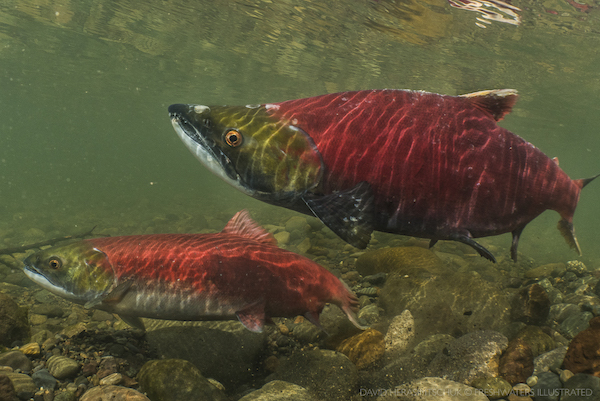
News & Views
Genetics
Research
Sustainability
New genome initiative aims to boost B.C.’s Sockeye salmon populations
February 12, 2021 By Mari-Len De Guzman
 Babine River Salmon Spawning (Photo: Freshwater Illustrated)
Babine River Salmon Spawning (Photo: Freshwater Illustrated) Researchers and conservation advocates in British Columbia, Canada, are collaborating on a development project aimed at saving wild Sockeye populations in B.C. waters.
Funded by Genome BC and other partners, the project seeks to develop a cost-effective, rapit genomic tool to monitor and characterize 118 Sockeye salmon populations in the north and central coast region of B.C. Researchers from Simon Fraser University (SFU), Fisheries and Oceans Canada (DFO), Coastal Rivers Conservancy and the Wild Salmon Center as well as Indigenous groups will be collaborating on this project, according to a press release from Genome BC.
“Responsible stewardship of wild sockeye salmon fisheries is becoming increasingly important as human pressures and environmental changes intensify. One of the key challenges in sustainable salmon management is the ability to identify and protect at risk populations within a mixed stock fishery,” Genome BC said in the release.
Sockeye fisheries in B.C. comprise of fish from multiple populations, each with unique life histories, genetic makeup and levels of reproduction. “Current methods for monitoring and protecting less productive, and therefore at risk, salmon populations would benefit from improvements in the speed, accuracy, and sensitivity of genetic tools applied to identify unique populations.”
With the genome tool, the collaborative team will also map migration routes and spawning times of populations of sockeye from four culturally important fisheries, according to the organization.
“These genomic tools are state of the art for high throughput genotyping and will bring new power to our ability to identify the streams of origin of salmon caught in fisheries,” said project co-lead Dr. Ben Sutherland of the Molecular Genetics Lab of Fisheries and Oceans Canada.
This project will aid in the assessment of sockeye salmon populations’ biological status in the north and central coast of BC. Sequencing individual genomes has allowed insight into the incredible diversity that exists amongst populations and this project is able to harness diversity as a genomic tool through a ‘SNP panel’.
“Pacific salmon have an amazing number of locally adapted populations with different local adaptations and genes. This project will help the effective stewardship of this remarkable biodiversity and sustainable fisheries,” said Dr. Jonathan Moore of Simon Fraser University, the project lead.
The team is collaborating with the Lax Kw’alaams fisheries, and the First Nations of Nuxalk, Kitasoo/Xai’xais and Heiltsuk, and the Coastal Coast Indigenous Resource Alliance on the development and implementation of this work.
This work is funded through Genome BC’s GeneSolve program which seeks to foster applied and translational research by connecting the producers of genomics driven technologies with its end-users or consumers in BC’s health, agrifood and natural resources sectors.
Genome BC is a not-for-profit organization supporting world-class genomics research and innovation to grow globally competitive life sciences sectors and deliver sustainable benefits for British Columbia, Canada and beyond.
Print this page
Advertisement
- Q&A: Government funding ushers new era for Cold Lake Hatchery
- Kvarøy Arctic appoints new VP of sales





